7 August 2017 | EEK!, Energy, Video |
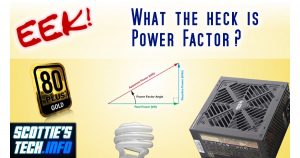 Power factor is one of those things that sounds really complicated, but it’s pretty simple when you boil it down. And every now and then, knowing a little something about power factor comes in handy.
Power factor is one of those things that sounds really complicated, but it’s pretty simple when you boil it down. And every now and then, knowing a little something about power factor comes in handy.
In short, power factor is the ratio of the real power consumed by a gizmo to the apparent power needed to be generated and delivered by the power company.
The reason for this “extra power” from the power company is the inductance and capacitance in your gizmo that results in shifting the AC current sine wave away from being perfectly in sync with the voltage sine wave.
You don’t really need to understand how all that works; just watch the vid to see why it matters!
(more…)
29 July 2017 | Computers, How Does it Work?, Video |
 You’d think that connecting an LCD screen to your puter would be straightforward. You’d be wrong! It all gets pretty confusing.
You’d think that connecting an LCD screen to your puter would be straightforward. You’d be wrong! It all gets pretty confusing.
There are several types of connectors and cables, and it’s difficult to know which one to use.
Often, you can even use an adapter cable to connect one type of connector to another, like HDMI → DVI.
This video is a summary of the various details of the most popular current cable types.
(more…)
26 July 2017 | How Does it Work?, Spare Me!, Video |
 Cryptocurrencies like Bitcoin and Ethereum are the wave of the future, right?
Cryptocurrencies like Bitcoin and Ethereum are the wave of the future, right?
So why is all the latest news about their value in US dollars? Isn’t that kind of backwards?
Obviously, these new digital currencies have a ways to go…
It doesn’t help that the systems in place are less than stellar, and we’re still seeing hacking resulting in people losing money.
But what about the future of blockchain technologies as a whole? Those are pretty awesome, right?
Well, yes and no. If you cut out the hype, you’ll have a much better idea about where all of this stuff is heading.
(more…)
8 July 2017 | Computers, How Does it Work?, Networking, Video |
 There are a few things you need to understand about staying safe and secure online. You need to realize what you’re actually up against.
There are a few things you need to understand about staying safe and secure online. You need to realize what you’re actually up against.
But don’t fret, because it’s really not a big deal if you always keep in mind how things usually work.
For example, e-mail is never really safe, HTTPS doesn’t really always keep your connection secure, you can be tracked online very easily despite what most people will tell you, and you should always use some kind of anti-virus/malware protection no matter what OS you use.
And remember that the OS you use makes very little difference if you’ve taken some basic precautions… In fact, thinking you’re safe because you use Not Windows is probably a bad idea!
(more…)
28 June 2017 | How Does it Work?, Video |
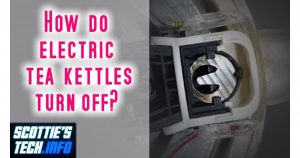 The age old question: How does your electric tea kettle know when to turn off? Is it electronic, or something simpler?
The age old question: How does your electric tea kettle know when to turn off? Is it electronic, or something simpler?
It turns out the key is a bimetallic strip. At a certain, carefully adjusted temperature, the bimetallic strip will bend just enough such that right when the water starts to boil, the bent strip will trigger the mechanism that flips the switch to the OFF position.
It doesn’t matter how much water is in the pot. Once the water is boiling, the temperature in the base will be at a certain point. That temperature point is the trigger threshold for the bimetallic strip. More or less.
That sounds complicated, but watch the video. It’s pretty simple!
(more…)
24 June 2017 | EEK!, Energy, How Does it Work?, Video |
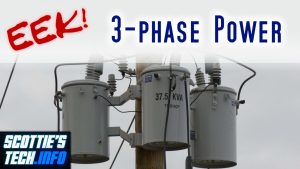 Why does AC electrical power come in 3 phases? What the heck is a “phase”, anyway?
Why does AC electrical power come in 3 phases? What the heck is a “phase”, anyway?
In this episode of the EEK! Series, you’ll learn about 3-phase power and its advantages.
In short: fewer wires, more power, and the Earth itself is a conductor.
In addition, 3-phase industrial motors are more efficient and don’t require a starting capacitor since the 3 phases are “rotating” already.
Be sure to watch EEK! #1 and EEK! #2 first!
(more…)
16 June 2017 | How Does it Work?, Video |
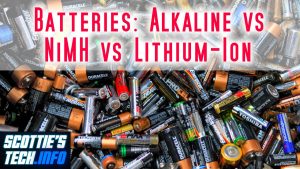 Ever wonder about the differences between alkaline, nickel metal hydride, and lithium-ion batteries? Wonder no more!
Ever wonder about the differences between alkaline, nickel metal hydride, and lithium-ion batteries? Wonder no more!
Alkaline batteries are great for their initial higher voltage, but the total current available drops off (along with the voltage) over time.
NiMH cells have a lower voltage, but it stays constant along with the available current.
And finally, lithium-ion batteries are in a class of their own: You can even get high C-rating Li-ion cells where you can safely pull even more current than the cell is rated at, and the voltage only drops a relatively small amount.
Watch the video for more details!
(more…)
11 June 2017 | How Does it Work?, Networking, Video |
 Ah, click farms…
Ah, click farms…
Click farms are organizations that you can pay to boost you or your product on social media.
They do their thing through the use of “bots” or semi-bots, which are automated systems to like, share, and otherwise promote something.
But hang on, is this real? According to two US universities, it’s very real…
(more…)
7 June 2017 | Do-It-Yourself, Video |
 This isn’t exactly “techie” in the traditional sense, but it does involve friction, and it’s super-handy to know. Actually, I thought everyone knew about this, but apparently not.
This isn’t exactly “techie” in the traditional sense, but it does involve friction, and it’s super-handy to know. Actually, I thought everyone knew about this, but apparently not.
What to do when your wooden drawers are sticking?
Easy! All you need is any old type of candle, a hand, and a mostly-functioning brain.
Anyway, I couldn’t resist making this one of those “Life Hack” videos. I hope this tip transforms your life in ways you cannot possibly imagine. 😜
(more…)
4 June 2017 | EEK!, Energy, How Does it Work?, Video |
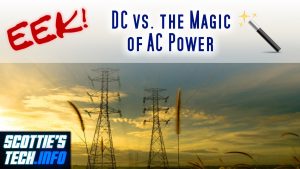 In episode 2 of the EEK! series, we cover the basic difference between direct current (DC) and alternating current (AC). Why is your home powered by AC, and not DC?
In episode 2 of the EEK! series, we cover the basic difference between direct current (DC) and alternating current (AC). Why is your home powered by AC, and not DC?
Simply put, AC allows the use of transformers to step up the voltage, step down the current, and therefore bypass the little problem of too much current flowing over a thin wire.
DC cannot be easily converted in this way for efficient power transmission over long distances. There’s more to say about AC, so look for a 3-phase video soon.
Check out the video below!
(more…)
 Power factor is one of those things that sounds really complicated, but it’s pretty simple when you boil it down. And every now and then, knowing a little something about power factor comes in handy.
Power factor is one of those things that sounds really complicated, but it’s pretty simple when you boil it down. And every now and then, knowing a little something about power factor comes in handy.










Recent Comments